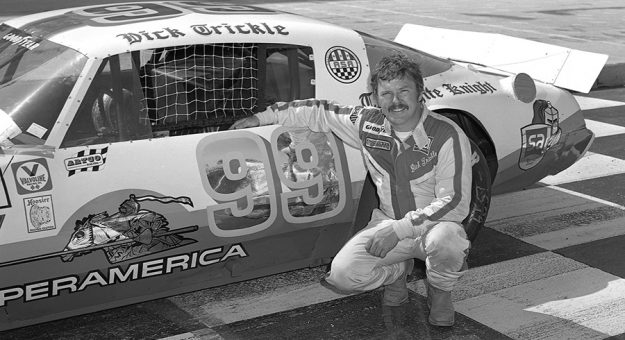INDIANAPOLIS — A million Februarys ago, after shooting the post-race breeze with a public relations man in the office at Florida’s New Smyrna Speedway, I was crossing the dark infield to get to my car, which was parked outside the backstretch.
From out of the shadows, a loud voice said, “Hey!”
There was no mistaking the figure hurrying toward me. The glowing cigarette and the bowlegged gait announced Dick Trickle, in town to play his annual role as late model hero in the World Series of Asphalt Stock Car Racing.
We knew each other, but only in a semi-social, friends-of-friends way.
“Where you going?” Trickle asked.
I mentioned a Daytona Beach saloon.
“Good,” said Trickle. “I’m riding with you.”
He had wandered away from his pit area and been left behind when his team headed out into the night. Apparently, each small group of crewmen and friends figured Dick was riding with a different small group of crewmen and friends. It happens.
The drive to the bar lasted 25 or 30 minutes. Trickle lounged in the passenger seat, his speech punctuated by sighs. He looked and sounded like a weary man at the end of a long season, not a busy racer at the beginning of one. But in a couple of months, as the weather warmed in different parts of the country, he’d be bouncing from ASA races to ARTGO races to weekly races in his beloved Wisconsin, winning more than his share. That annual process recharged him. By summer’s end, you’d think he was the Energizer bunny in Nomex.
I miss Trickle. No, we weren’t pals, but it was good just to know he was around, walking this earth, doing his thing. He’d have turned 80 this month, on Oct. 27, and that would have been something to celebrate. But he has been gone since May 2013, when, dogged by fierce, persistent pain that no amount of hospital tests could pin down, he took his own life.
And, Lord, what a life it was. He recalled his rural hometown, Rudolph, having “a post office, a grocery store, two feed mills, three taverns.” His dad, a blacksmith, taught young Richard Leroy Trickle to sharpen plowshares and repair the broken machinery brought in by the area’s dairy farmers. Like any kid, he filled his spare time with adventure.
When he was in the third grade, he and a cousin were “playing tag in the rafters” of a two-story house under construction. A misstep sent him freefalling 30 feet to the concrete basement floor; his shattered hip led to that distinctive walk.
Fate put him in the same Boy Scout troop as two area kids, Tom Reffner and Marv Marzofka. When Marzofka got his hands on an old Studebaker, the three of them turned it into a stock car. Before long, Reffner and Trickle had race cars, too.
All of them had terrific driving careers, but Trickle roamed the farthest and won the most. In 1972 alone he captured 67 features, transitioning from regional hero into national legend.
Then came seven ARTGO championships in nine seasons, back-to-back ASA titles in 1984-’85, and victories at all the hallowed late model arenas, places that needed only one name: Rockford, Nashville, Illiana, Elko, Heidelberg, Winchester, Salem, I-70, Springfield, St. Paul, Cayuga, Montgomery and more. And faraway kids learned Wisconsin geography by looking up the towns where Trickle won: Wausau, Slinger, Madison, La Crosse, Kaukauna, Wisconsin Dells, Lake Geneva.
For a long time, he rejected offers to run in the NASCAR Cup Series. None were from winning teams, and a midpack ride didn’t appeal to Trickle’s hunger or his bank account. It wasn’t until 1989, when he was given a seat in the Stavola Brothers Buick originally vacated by the injured Bobby Allison, that moving south made sense.
His second outing in the Stavola car came at Atlanta, where he finished third. At 48, he was rookie of the year, the first grandfather to earn that honor.
Across the next 13 seasons he had good rides, but not great ones, so he never did win a Cup Series race, although he beat several Cup Series regulars in bagging an Xfinity Series score at Darlington.
The last time I spoke with him was in 2012, when I traveled to North Carolina to interview him for a magazine feature. My recorder ran for over an hour, and when I shut it off we chatted away for another 90 minutes. It was a great afternoon.
Two moments stick in my brain.
Of his climb to short-track stardom, Trickle said, “Everybody wants to race, but they don’t realize how many times you’ve got to pull yourself out of the ditch to have a career at it.”
And reflecting on his late move to the Cup Series, he brought up that stellar third-place run at Atlanta. “Glen and Leonard Wood talked to me later, and they were very nice. They said, ‘Trickle, if you had come down here 20 years ago, you’d have been another Earnhardt, another Waltrip.’
“I told ’em, ‘Yeah, but I wouldn’t trade those 20 years for anything.’ And I meant it. I mean, who had as good a life as I had?”
Amen to that.
